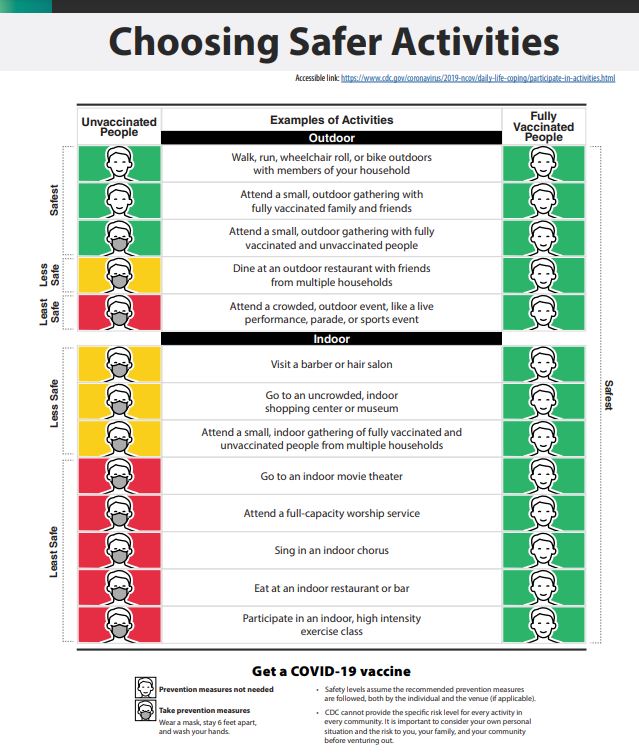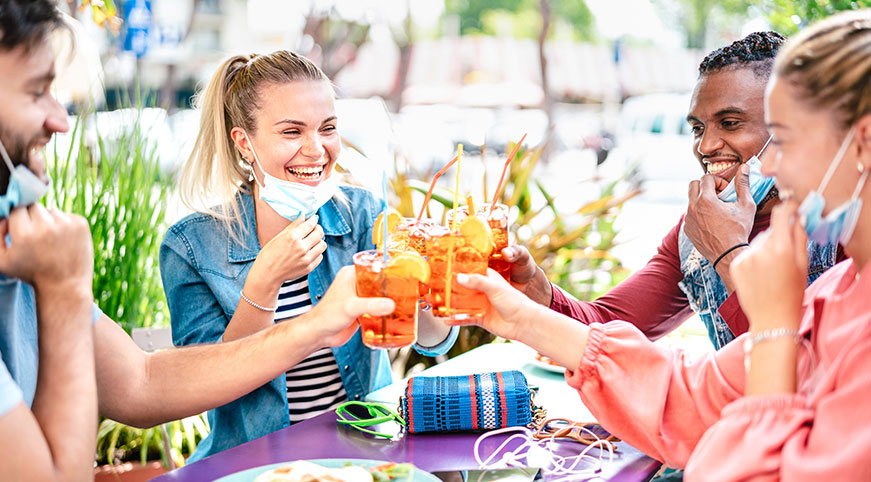Posted by Divya Sathyanarayanan
Are you fully vaccinated against COVID-19? If so, you can slowly get back to your pre-pandemic way of life and enjoy certain activities safely, once again. To better understand what activities are safe and when you still need to take precautions, we spoke with Dr. Gisela Rosario, Infectious Disease Specialist, at CHA HPMC.
What activities are safer to do once an individual is fully vaccinated?
People are considered fully vaccinated two weeks after the second dose in a 2-dose series vaccine or 2-4 weeks after a single dose vaccine. Fully vaccinated people can resume activities that they did prior to the pandemic without wearing a mask or physically distancing, except when required by local laws or regulations.*
- Lower risk activities are those performed outdoors such as eating at a restaurant, going to a concert or sporting event, and playing an outdoor, non-contact team sport. Other activities include getting a haircut, commuting on public transportation, getting a manicure or pedicure, and visiting elderly relative who has also been vaccinated.
- Medium risk activities include eating indoors at a restaurant, flying on a commercial airline, taking an international trip, going to the gym, and visiting elderly relatives who have not yet been fully vaccinated.
- High risk activities include going to an indoor concert, indoor sporting event, attending a medium to large party indoors, attending a large conference, and playing an indoor sporting event.
Masks and physical distancing are still required when going to the doctor’s office, hospitals, or long-term care facilities.

Guidance on Safer Activities by CDC
Can fully vaccinated people meet other vaccinated people without masks or distancing in indoor settings? Is there a size limit to how many fully vaccinated people can get together?
Fully vaccinated people can gather indoors without masks or social distancing with other fully vaccinated people. Individuals that are severely immunocompromised must still exert caution even if fully vaccinated as they may not mount a robust immune response to the vaccine. There is not a particular size limit as long as it can be verified that everyone is vaccinated and there are no individuals with high risk for severe illness.
Can fully vaccinated people meet with unvaccinated family members/friends indoors without masks or distancing? How about outdoors?
Fully vaccinated people can gather indoors without masks with unvaccinated people from one other household, unless any of those individuals is at increased risk for severe illness from COVID-19, such as those immunocompromised. If gathering indoors with unvaccinated people from multiple households, even small gatherings, masks and physical distancing should still be followed. Outdoor gatherings will allow for meeting with more unvaccinated people from multiple households as long as social distancing can be followed.
What if the adults are vaccinated but the kids (under the age of 12) aren’t?
Studies have showed that kids are less likely to develop severe illness from COVID-19 as compared to adults. Younger children don’t get symptomatic disease as often and don’t appear to transmit the disease as much, if infected. Every family will need to make the decision based on their particular risk tolerance. Families with immunocompromised individuals should exert more caution and outdoor gatherings will be safer in this case.
Are there any activities that one should prioritize after getting vaccinated?
Medical checkups must be prioritized especially if they were follow-up for existing conditions, dental care, and postponed medical procedures, or if they were for screening for diseases such as cancer (i.e. colonoscopy, mammogram, or pap smears) and diabetes.
Can fully vaccinated individuals travel? If yes, what safety measures should be taken?
Traveling does put you in situations that may pose risk of infection, even if fully vaccinated. If you decide to travel, you should still wear mask, practice good hand hygiene, and social distancing when possible. If you travel within the US, you do not need to get tested before or after travel or self-quarantine after travel. If traveling outside the US, you may need to get tested before leaving the country, if required by the destination. You still need to show a negative test result or documentation of recovery from COVID-19 before boarding an international flight to the US. Per the CDC recommendation, you should still get tested 3-5 days after international travel but you do not need to self-quarantine after arriving in the US.
* Centers for Disease Control and Prevention. Interim Public Health Recommendations for Fully Vaccinated People. Retrieved from https://www.cdc.gov/coronavirus/2019-ncov/vaccines/fully-vaccinated-guidance.html
Go to our Blog
 ENGLISH
ENGLISH KOREAN
KOREAN Spanish
Spanish RUSSIAN
RUSSIAN Armenian
Armenian FILIPINO
FILIPINO Chinese (Simplified)
Chinese (Simplified) Chinese (Traditional)
Chinese (Traditional)

최신댓글